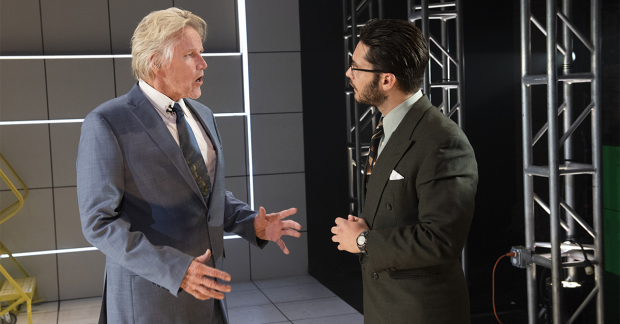Only Human, Starring Gary Busey as the Almighty, Will Make You Doubt the Existence of God
They want you to think this is like ”The Office”, but ”The Office” is better.

(© Ahron R. Foster)
Let's be real. The only reason you're going to see Only Human — hell, the only reason you've heard of this two- hours-wasting off-Broadway musical — is Gary Busey. In Only Human, an unfunny workplace comedy about a group of middle managers trying to create the human race, Busey, famous for being a livewire, plays God.
And the producers said, "Let there be great marketing copy," and lo, there was great marketing copy.
Unfortunately, Only Human is an indulgent mess of a show. Surprisingly, however, the indulgence isn't in Busey. The Oscar-nominated actor and former star of Donald Trump's Celebrity Apprentice, is basically a prop that spends huge swaths of stage time sitting on the sidelines. No, Only Human indulges in Mike Squillante, a relatively unknown singer-songwriter who not only makes his stage-acting debut in the show, but also wrote its score and came up with the concept.
Squillante plays Lou (as in, -cifer), one of the trio of mid-level angels tasked with inventing humanity. Jesus, or Jay (Evan Maltby), the boss's stoner son, and Mary Magdelene, or Maggie (Kim Steele), a forward-thinking female who is generally smarter than everyone else, never see eye to eye with their hotheaded colleague, with hellacious results.
Only Human is like a less enjoyable version of The Office, with barely drawn characters who lack any sort of discernable personality. (Lou is obviously a bad boy because he wears eyeliner and has tats and shellacked hair.) In general, Carson's book is an incomprehensible mess, the quality of Squillante's score can be summed up in its groan-inducing rhyming of "loner" and "persona," and N.J. Agwuna's production most often feels like an assault on your senses: The volume is loud and everything is pitched to 11.
Squillante is more convincing as a singer than he is as an actor, and, unsurprisingly, he gives himself two big second-act solos, and takes the lead on most of the other numbers (including an angry "What You Own" from Rent-style duet between him and Maltby called "Who Are You?," which dramaturgically comes way too early to be effective). Maltby has absolutely nothing to do aside from look like a stoner, which he does credibly in Avery Reed's workaday costumes. Steele, who is given the occasional chance to show off an impressive singing voice, fades into the background when she really needs to come to the fore.
Busey seems to be having a lovely time watching his fellow performers from an onstage cubicle office (Andrew Moerdyk designed the graph paper-inspired set, which is lit with rock-and-roll neon by Eric Norbury). He's essentially playing himself, speaking with the halting staccato of someone being fed lines. If that's what you want from a night of theater, you'll probably love this. But if you just want to see Gary Busey in the flesh, save your money and wait at the stage door.







